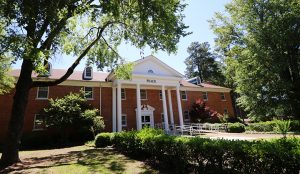 Whitney Gass, assistant professor of criminal justice at Southern Arkansas University, taught Field Practicum (internship) in the Spring Semester of 2020 in which students interned in four different states: Arkansas, Louisiana, Texas and Florida – a first for the program.
Whitney Gass, assistant professor of criminal justice at Southern Arkansas University, taught Field Practicum (internship) in the Spring Semester of 2020 in which students interned in four different states: Arkansas, Louisiana, Texas and Florida – a first for the program.
A total of 14 students were enrolled.
Kyle West, a senior Criminal Justice major from Lithia, Florida, interned with the Hillsborough County Sheriff’s Office in Brandon, Florida.
Two other of Gass’ students, Andia Addy, a senior Criminal Justice major from Simms, Texas, and Avel Perez, a senior Criminal Justice major from De Queen, Arkansas, both interned with the Texarkana (Texas) Police Department.
Abby Morrow, a May 2020 graduate in Criminal Justice, interned with the David Wade Correctional Center, a medium-security prison in Homer, Louisiana.
Ten other students were dispersed throughout various agencies in Arkansas. Two of them, Reagan Pyron and Alexandria Smith, were placed with the Magnolia Police Department. Erin Brinkley, Kiarra Evans, and Kira Johnson interned with the Columbia County Sheriff’s Office, where they gained experience through shadowing and observation with Criminal Investigator Leroy Martin, dispatch, court and jail administration.
Jacob Brantley interned with the SAU Police Department, Kanira McCoy and Keelie Porter interned with the Arkansas Department of Community Correction in Union County and Quantiesha Coats and Autumn Faulkner earned their field experience hours with the Arkansas Department of Community Correction in Columbia County.
All students are senior Criminal Justice majors at SAU.
The Field Practicum course in the Criminal Justice program is offered every semester and designed to give students first-hand experience in one or two areas of their chosen field: institutional corrections, community corrections, courts, law enforcement, investigations, etc. Mrs. Gass discusses future plans and career goals with the students before reaching out to community contacts for possible placement.
“Our local agencies have been so accommodating and welcoming to our students,” she said. “There are some amazing agencies in this area and they work hard to make sure SAU’s students gain knowledge and experience during their internships.”
Students are required to “work” for a minimum of 60 hours. Many of these students do this while taking a full academic load and working another full- or part-time job. The class also requires a portfolio including a professional cover letter and resume. The portfolio also requires students to provide proof of such documents as a Social Security card, a birth certificate, and a driver’s license. All county, state, and federal agencies require these documents for the hiring process.
“I want our students to be prepared and have access to these documents so that agencies are waiting on our graduates,” said Mrs. Gass. “There is a journaling requirement for this course as well. Criminal justice professionals have a high burnout rate which means they leave the field after only a few short years. Professionals in this field deal with some heavy, sad, and disturbing issues. Having a positive outlet for their fears, frustrations, anxieties, and sadness can promote a healthy work-life balance.”
Field students are encouraged to practice self-care and recognize signs of burnout before they throw in the towel.
The final piece of the course is Arkansas’s Mandated Reporter Training where students “attend” an online course and are tested over their knowledge of what to do in the instance of suspected or reported child abuse. Criminal Justice professionals by-in-large are mandated reporters and it is important that graduates know exactly what this means and entails before they are employed with agencies in the real world.
